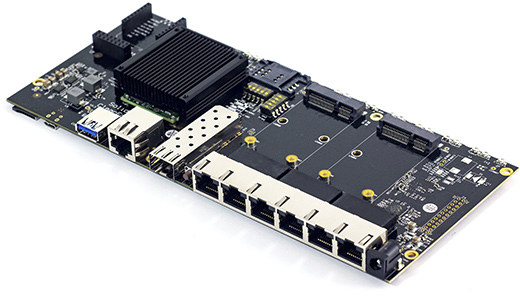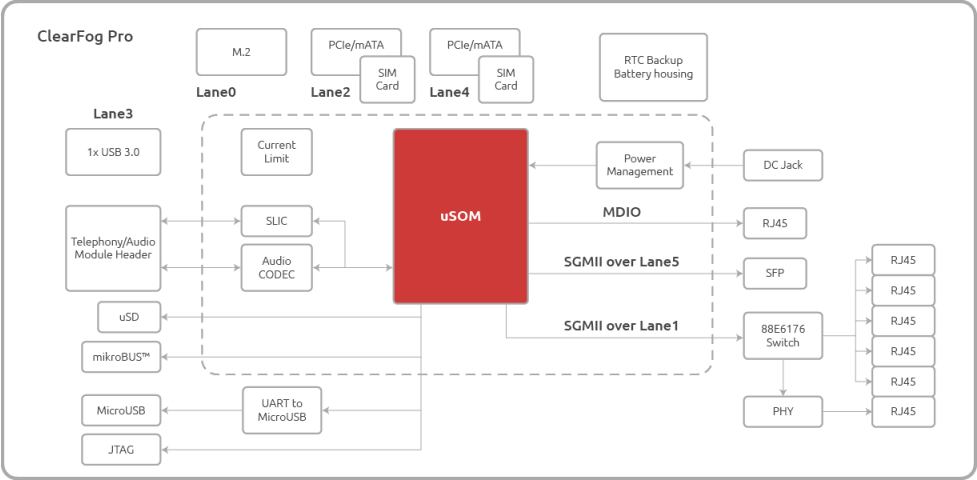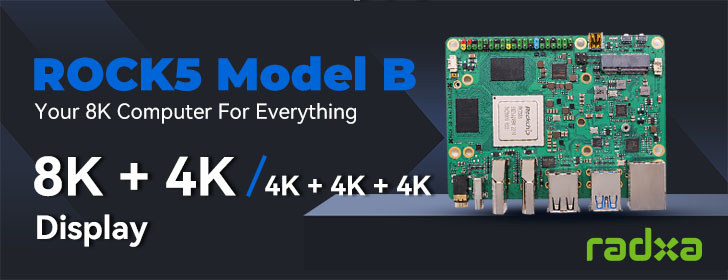Last month, I wrote about Turris Omnia an upcoming open source hardware router board with 6 Gigbit Ethernet ports and an SFP cage powered by Marvell ARMADA 385 processor. SolidRun has now unveiled ClearFog Pro router board with similar features, but opting instead for either Marvell ARMADA 380 or 388 processor.
 The company will also soon launch or lower-end version called ClearFog Base with the less ports, but with the same system-on-module as ClearFog Pro:
The company will also soon launch or lower-end version called ClearFog Base with the less ports, but with the same system-on-module as ClearFog Pro:
- Processor – Marvell ARMADA 380 (88F6810) single core or 388 (88F6828) dual core ARMv7 processor (Cortex A9 class) @ up to 1.6 GHz with 1MB L2 cache, NEON and FPU
- System Memory – 256MB to 1GB 16-bit DDR3L (ARMADA 380) or 32-bit DDR3L (ARMADA 388)
- Storage
- Pro version – M.2 slot, 1x micro SD slot, 2x mSATA/mPCIE
- Base version – M.2 slot, 1x micro SD slot, 1x mSATA/mPCIE
- Connectivity
- Pro version – 6x switched Gigabit Ethernet ports, 1x dedicated Gigabit Ethernet port, 1x SFP cage
- Base version – 2x dedicated Gigabit Ethernet ports, 1x SFP cage (ARMADA 388 only)
- PoE expansion header
- USB – 1x USB 3.0 port
- Expansions
- 1x or 2x mini PCI Express slots (shared via mSATA above)
- GPIO header (mikroBUS standard)
- Audio/Telephony – Analog audio/TDM module support
- Debugging – micro USB port for serial console. Pro version only: JTAG header
- Misc – RTC with battery slot, LEDs, user push buttons
- Power Supply
- Pro version – 9V – 34V DC input; “advanced power control”; fan control
- Base version – 5V input; wide range ready
- Dimensions
- Pro version – 225 x 100 mm
- Base version – 160 x 100 mm (TBC)

The boards support Linux 3.x distributions such as OpenWRT and one build with the Yocto Project. The block diagram also shows two SIM card slots not listed in the specs, and which should be on the top right of the processor. The routers board are comprised of a baseboard and the company’s microSOM-a1 based on Marvell ARMADA 380, or microSOM-a2 with ARMADA 388 processor. The mikroBUS header allows you to use MikroElektronika Click add-on boards just like in HummingBoard-Gate board, and a module with audio and a SLIC would make the board suitable for VoIP applications too.
ClearFog Pro router board can be purchased right now for $170 without power supply, metallic enclosure or 8GB micro SD card, and if you want the full package you’ll need to spend $240, which includes $50 for the case itself. SolidRun did not say anything about price and availability for ClearFog Base board, except it’s coming soon. You can find further details, including documentation and schematics (PDF), on Solidrun’s ClearFog and ARMADA MicroSOM product pages.
Via Liliputing

Jean-Luc started CNX Software in 2010 as a part-time endeavor, before quitting his job as a software engineering manager, and starting to write daily news, and reviews full time later in 2011.
Support CNX Software! Donate via cryptocurrencies, become a Patron on Patreon, or purchase goods on Amazon or Aliexpress




Some very strange design decisions going on there for me. I’m not sure that block diagram makes sense either.
The SoC supports 2 USB 3.0 lanes but they only expose 1, plus it supports several USB 2 lanes but don’t expose any (except a debug (slave) port).
4 SATA 3 lanes are supported but they don’t expose any (WTF?).
M2 ins’t natively supported so is going to be limited to whatever speed bus they’ve got it hanging off.
Other things too.
Bizzare!!!
The specs that Marvell provides are possible configurations. All the I/O is supported by the SOC over SerDes lanes. Those lanes need to be split up to support the various protocols. This board is configured to do USB 3.0, and has two slots that can be configured to be either PCIe or mSata. The m.2 slot supports B/M ssd modules and has been benchmarked at 545MB/s sequential read.
If you don’t like the design of the board then you are free to buy they microsom and design your own board 🙂
Those speeds are very slow for m.2. I can’t see why that would be chosen over SATA. Little performance improvement and much more expensive than SATA.
As you rightly point out it comes down to design decisions, I just find some of them bizarre.
@The Cageybee Why wouldn’t M.2 be supported, it’s PCI Express. Two of the SATA lanes are supported via the shared mini PCIe slots, so you can either add a Wi-Fi card or an SSD, or even a mini PCIe to SATA adapter. The processors are most likely limited by the multiplexed SerDes which only has 5 or 6 lanes, so they can only offer that many interfaces in total, even though technically the SoC supports more internally, they can’t be physically used due to that limitation. http://www.marvell.com/embedded-processors/armada-38x/ In this case Lane 0 is for the M.2 slot, Lane 1 is… Read more »
@The Cageybee
M.2 is natively supported. One USB 3.0 (that has one USB 2.0) is exposed and the other two USB 2.0 are connected to the mini pcie connectors as part of the mini pcie standard is to support USB 2.0
Good news: Armbian already supports the Clearfog Pro after one day of tinkering: http://forum.armbian.com/index.php/topic/590-quick-review-of-solidruns-clearfog/
Improvements compared to Solid-Run’s software offerings: We patched the legacy 3.10.y kernel to the latest version (3.10.94) and are already in the process of releasing an image with mainline kernel (4.4) soon. Also looking forward to the patches the Turris folks provide for their Omnia router to integrate them into Armbian so all Marvell 38x devices supported by Armbian in the future can benefit from: https://lists.debian.org/debian-arm/2015/11/threads.html#00071